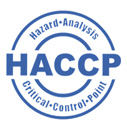400-8081-924 / 15006421779
400-8081-924/15006421779

The Food Safety Management system-HACCP
HACCP is an abbreviation for English hazard Analysis Critical control point. HACCP is a widely recognized international food safety management system, in the food production, processing, and follow-up services, to help food enterprises in line with the relevant national laws and regulations, to ensure the safety of food.
HACCP has become a mandatory norm under the law in many countries. HACCP management system has been gradually extended from the original food processing to the entire food supply chain (from raw material supply, food production/processing, packaging to storage and transportation) and food consumption in all aspects.
The standard requires food-related enterprises to identify possible biological/chemical/physical hazards in their business processes, to conduct hazard analysis of these factors, to identify critical control points, to develop control ranges in accordance with regulatory requirements, to propose necessary preventive and corrective measures, and to carry out programmatic controls to eliminate hazards or control hazards to a certain extent.
China's HACCP certification began on March 20, 2002, the national CNCA issued the 3rd Bulletin "Food Production Enterprises hazard analysis and Critical Control Point (HACCP) Management System Certification Management Regulations", and implemented from May 1, 2002.
The implementation of this Regulation further regulates the implementation of HACCP system certification supervision and management work in food production enterprises, HACCP system certification management to achieve a legally compliant. April 19, 2002, the State administration of quality Supervision and inspection issued the 20th order "Export food production enterprises health registration and Registration Administration Regulations", with effect from May 20, 2002.
The regulations require that the export food producers listed in the catalogue of products to be reviewed in the HACCP system for health registration need to establish the HACCP system in accordance with the health requirements of the export food production enterprises and the International Codex Alimentarius Commission's Hazard analysis and Critical Control Point (HACCP) system and its application guidelines. In accordance with the above regulations, the HACCP system must be established at present there are six types of production and export enterprises, respectively, the production of aquatic products, meat and meat products, frozen vegetables, fruit and vegetable juice, meat and aquatic products of frozen food, canned products enterprises, this is China's first mandatory requirements for food production enterprises to implement HACCP system.
It marks the application of HACCP into a new stage of development in China. HACCP certification in China has experienced 10 years (2002-2011) of development, the number of certified enterprises has exceeded 5,000, but, with the development of HACCP certification, HACCP certification basis and certification procedures are not uniform, to standardize HACCP certification activities, the negative effects of improving the effectiveness of certification are becoming increasingly apparent. There have been "CNAB-SI52:2004 based on HACCP food safety management System norms (trial)", "SN/T1443." 1-2004 Food Safety Management system requirements, "general evaluation guidelines" food Safety Management System Requirements "(HACCP-EC-01)," CAC general principles of food hygiene and HACCP Application Guidelines "," GB/T 27341 Hazard Analysis and Critical Control point system food production enterprises common requirements " And so on a number of standards.
In order to standardize HACCP certification, the CNCA has issued the "Enterprise Hazard Analysis and Critical Control Point (HACCP) system certification implementation Rules", which has been in effect since May 1, 2012. The new HACCP certification implementation rules, based on China's HACCP standards and certification system, consider the global Food Safety Action Plan, which includes the International Codex Alimentarius Commission (CAC) standards and GFSI standards of the International Food Business Forum (CIES), determine the basis and mode of certification:
The certification is based on: GB/T27341 "Hazard Analysis and Critical Control point system food production enterprises general Requirements" and GB14881 "General hygiene practice for food manufacturing”.
聯(lián)系我們
| 電話: | 0532-67739388 |
|
郵箱:info@gfs-global.cn |
|
|
May Sheng 盛老師 |
|
|
電話: 0532-67739388 |
|
|
郵箱:may@gfs-global.cn |
|
|
微信: 15006421779 |
|
|
Johnsy Li 李老師 |
|
|
電話: +86 18653225507 |
|
|
郵箱:johnsy.li@gfs-global.cn |
|
 |
|